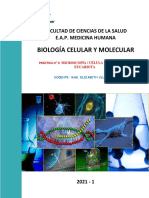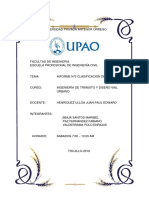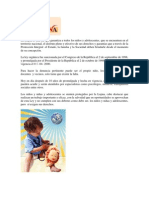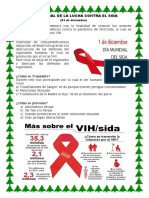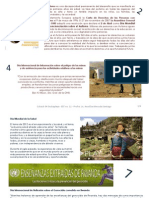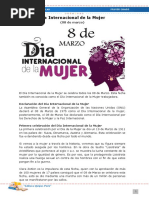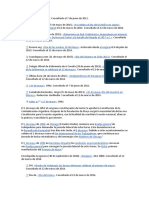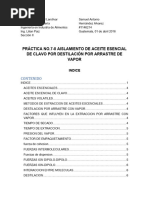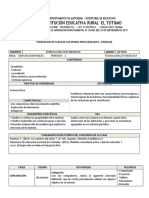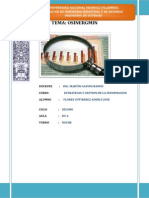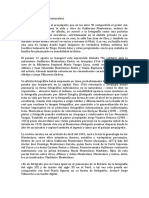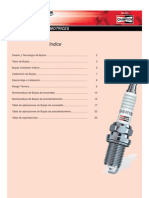Apunte 5
Apunte 5
Cargado por
VicenteCopyright:
Formatos disponibles
Apunte 5
Apunte 5
Cargado por
VicenteTítulo original
Derechos de autor
Formatos disponibles
Compartir este documento
Compartir o incrustar documentos
¿Le pareció útil este documento?
¿Este contenido es inapropiado?
Copyright:
Formatos disponibles
Apunte 5
Apunte 5
Cargado por
VicenteCopyright:
Formatos disponibles
El
15 de mayo se celebra el Día Internacional de la Familia, según la ONU.21
Several surveys from many countries around the world pointed out that the public’s
awareness of their blood pressure levels was very poor (1–9). Even in highly developed,
resource-rich countries with high-quality health carse systems, such as Canada, awareness
of hypertension was only 58% (8). As many of the developing countries transition from
infectious to degenerative chronic diseases, the prevalence of hypertension is increasing
(10). At the same time, public awareness of hypertension in these low- and middle-income
countries is quite dismal (11). The 2002 World Health Report (12) stated that hypertension
is the leading cause of death worldwide.
Epidemiological studies (13–15) have clearly shown that hypertension is a ‘silent killer’,
with no warning signs. Therefore, knowing that one’s blood pressure is elevated allows
that individual to take some action to mitigate the rising blood pressure, thus preventing
potential end-organ damage, including myocardial infarction, kidney failure and
cerebrovascular stroke. There is, however, a continued myth among most of the world’s
population – among both the well educated and the less educated – that not knowing the
condition is ‘bliss’. On the contrary, a number of studies have shown that early diagnosis
and treatment of hypertension leads to better quality of life and increased longevity.
El 15 de mayo se celebra en México y en Colombia el Día del Maestro.22
El 17 de mayo se celebra el Día Mundial de las Telecomunicaciones y la Sociedad
de la Información, establecido por la UIT.23
El 17 de mayo se celebra el Día Mundial de la Hipertensión para desarrollar y
aumentar en todo el mundo la conciencia de la necesidad de prevenir, diagnosticar
y controlar la hipertensión arterial.24
El 17 de mayo se celebra el Día das letras galegas.25
19 de mayo de 1977: Nace en la Culta & Olímpica Ciudad del Valle de la
Concepción de la Vega Real el abogado, activista, & Ex procurador
fiscal Dominicano Cirilo J. Guzmán.
El 20 de mayo se celebra el Día Mundial de las Abejas, declarado por la ONU para
tomar consciencia del papel de los polinizadores.
El 21 de mayo se celebra el Día Mundial de la Diversidad Cultural para el Diálogo y
el Desarrollo, según la ONU.26
El 22 de mayo se celebra el Día Internacional de la Diversidad Biológica, según la
ONU.27
El 24 de mayo de 1822 se realiza la batalla de Pichincha en Quito, y se proclama la
independencia de Ecuador.28
Del 25 al 31 de mayo se celebra la Semana de Solidaridad con los pueblos de los
territorios no autónomos, según la ONU.29
También podría gustarte
- Periodico Mural MarzoDocumento8 páginasPeriodico Mural MarzoYvette Yuribia Breceda50% (2)
- Efemerides de Seguridad y Salud LaboralDocumento5 páginasEfemerides de Seguridad y Salud LaboralPedro Gomez100% (1)
- Guía para La Práctica #3Documento15 páginasGuía para La Práctica #3Jorge Burneo100% (1)
- Caso Fashion GroupDocumento13 páginasCaso Fashion GroupKatty Cabanillas AmaroAún no hay calificaciones
- Clasificacion de Una Red VialDocumento16 páginasClasificacion de Una Red VialJhoan Enrique Valderrama PoloAún no hay calificaciones
- Apunte 4Documento1 páginaApunte 4VicenteAún no hay calificaciones
- 8 de MarzoDocumento9 páginas8 de MarzoFlor De Maria UGAún no hay calificaciones
- Informacion 1Documento2 páginasInformacion 1VicenteAún no hay calificaciones
- Charla Cívica 2023Documento7 páginasCharla Cívica 2023Juan Luis Quispe Escobedo100% (1)
- EfemeridesDocumento8 páginasEfemeridescarolina infanteAún no hay calificaciones
- Batalla Del PichinchaDocumento3 páginasBatalla Del PichinchaGiovanna OrqueraAún no hay calificaciones
- Efemerides de MayoDocumento2 páginasEfemerides de Mayoramon lopezAún no hay calificaciones
- InvestigacionDocumento9 páginasInvestigacionPedro Nicolas Marin SilvaAún no hay calificaciones
- MAYODocumento7 páginasMAYOAlfonso RomeroAún no hay calificaciones
- Efemérides Primer Trimestre 2024Documento2 páginasEfemérides Primer Trimestre 2024proyectoucsunicefAún no hay calificaciones
- EfemeridesDocumento44 páginasEfemeridesAlternativa Gremial CoadAún no hay calificaciones
- Fechas Cívicas de Mayo y JunioDocumento3 páginasFechas Cívicas de Mayo y JunioAlexanders Mercado100% (1)
- CNN 182 HDocumento5 páginasCNN 182 Hgerardo auvertAún no hay calificaciones
- Fechas para Actividades A Realizar en Sector SaludDocumento4 páginasFechas para Actividades A Realizar en Sector Salud모니수시Aún no hay calificaciones
- Calendario CivicoDocumento9 páginasCalendario Civicoflor allison neira morenoAún no hay calificaciones
- Periodico MuralDocumento9 páginasPeriodico MuralOdilia GuereroAún no hay calificaciones
- Efemérides de SaludDocumento6 páginasEfemérides de SaludCristian EvansAún no hay calificaciones
- Calendario Civico EscolarDocumento6 páginasCalendario Civico EscolarYanet Condori MamaniAún no hay calificaciones
- Calendario Salud 2018Documento8 páginasCalendario Salud 2018Lizbeth CortezAún no hay calificaciones
- Efemerides AnnyDocumento2 páginasEfemerides AnnyNayleth de NogueraAún no hay calificaciones
- Documento 1Documento2 páginasDocumento 1VicenteAún no hay calificaciones
- Celebraciones Marzo 2020Documento7 páginasCelebraciones Marzo 2020Jessica FaustorAún no hay calificaciones
- AutismoDocumento7 páginasAutismonayeli jhoselin perez ochoaAún no hay calificaciones
- Efemérides Más RelevantesDocumento10 páginasEfemérides Más Relevantesyorman hernandesAún no hay calificaciones
- Trabajo Final EnsayoDocumento12 páginasTrabajo Final EnsayoPaola Magdalena Ortega EspinoAún no hay calificaciones
- Fechas Cívicas Del Mes de DiciembreDocumento4 páginasFechas Cívicas Del Mes de DiciembreCone Buby86% (7)
- Fechas Importantes Relacionadas Con La Promoción para La SaludDocumento11 páginasFechas Importantes Relacionadas Con La Promoción para La SaluddeysiAún no hay calificaciones
- Efemerides AbrilDocumento9 páginasEfemerides AbrilPedro OcHo'aAún no hay calificaciones
- Día Mundial de La NaturalezaDocumento5 páginasDía Mundial de La Naturalezaazulceleste42Aún no hay calificaciones
- Efemérides InternacionalesDocumento8 páginasEfemérides InternacionalesclemenAún no hay calificaciones
- Calendario Cívico Escolar - Editora Quipus PerúDocumento12 páginasCalendario Cívico Escolar - Editora Quipus PerúManuel FloresAún no hay calificaciones
- Efemerides de OctubreDocumento5 páginasEfemerides de OctubreMarior BriceñoAún no hay calificaciones
- Calendario Cívico Escolar - Editora Quipus PerúDocumento12 páginasCalendario Cívico Escolar - Editora Quipus PerúReyna ruth Cano mamaniAún no hay calificaciones
- Fechas Cívicas Marzo 2024Documento15 páginasFechas Cívicas Marzo 2024Gueysi Velasquez YenqueAún no hay calificaciones
- Fecha Civica DiciembreDocumento6 páginasFecha Civica Diciembrejose100% (4)
- Fechas CivicasDocumento30 páginasFechas Civicasgrimaldo gomez liviasAún no hay calificaciones
- Día Mundial de La AlimentaciónDocumento6 páginasDía Mundial de La AlimentaciónJesus PlataAún no hay calificaciones
- Efemérides de Educación Especial Más DestacadasDocumento11 páginasEfemérides de Educación Especial Más DestacadasAida Cahum100% (1)
- Calendario EfemerideDocumento3 páginasCalendario EfemerideEssalud AmazonasAún no hay calificaciones
- Efemérides de Días Mundiales e Internacionales ABRILDocumento6 páginasEfemérides de Días Mundiales e Internacionales ABRILAna Elia Almeyda SantiagoAún no hay calificaciones
- CampañaDocumento7 páginasCampañajhojanAún no hay calificaciones
- Día Mundial de La DiabetesDocumento5 páginasDía Mundial de La Diabetes15987ernan15987Aún no hay calificaciones
- Calendario Cívico Escolar Diciembre - 6ºDocumento4 páginasCalendario Cívico Escolar Diciembre - 6ºjuan bellido salvatierraAún no hay calificaciones
- Revista Conocimiento 122Documento92 páginasRevista Conocimiento 122Revista Conocimiento en línea.100% (3)
- Cuaderno Administrativo 2016 - 2017 FUMIRA 2Documento74 páginasCuaderno Administrativo 2016 - 2017 FUMIRA 2dorielis piñaAún no hay calificaciones
- Calendario Cívico Escolar - Editora Quipus PerúDocumento12 páginasCalendario Cívico Escolar - Editora Quipus PerúmarcialAún no hay calificaciones
- Fechas Cívicas Del Mes de MayoDocumento1 páginaFechas Cívicas Del Mes de MayoSAMUEL GONZALO MUNIVE PILCOAún no hay calificaciones
- Calendario Cívico Escolar-7Documento4 páginasCalendario Cívico Escolar-7alan100% (1)
- Dias Festivos PerpetuosDocumento2 páginasDias Festivos PerpetuosJavier Valverde RodríguezAún no hay calificaciones
- Fechas Civicas Del Mes de Marzo ANDY JESUS SDocumento11 páginasFechas Civicas Del Mes de Marzo ANDY JESUS SMerced Paola Saldarriaga GonzalesAún no hay calificaciones
- Efemerides de MarzoDocumento5 páginasEfemerides de MarzoJosabethAún no hay calificaciones
- Nuevo Calendario Civico Escolar EptDocumento58 páginasNuevo Calendario Civico Escolar EptJESSICA CUBA YALLEAún no hay calificaciones
- Calendario de Dias FestivosDocumento9 páginasCalendario de Dias FestivosPatricia PulidoAún no hay calificaciones
- Calendario CivbicoDocumento3 páginasCalendario CivbicoFranchescoZapatiAún no hay calificaciones
- Reporte sobre la familia en México 2023: Cambio tecnológico y cultura digitalDe EverandReporte sobre la familia en México 2023: Cambio tecnológico y cultura digitalAún no hay calificaciones
- Toda la verdad sobre el COVID-19: La historia detrás del gran reinicio, los pasaportes de vacunación y la nueva normalidadDe EverandToda la verdad sobre el COVID-19: La historia detrás del gran reinicio, los pasaportes de vacunación y la nueva normalidadCalificación: 4 de 5 estrellas4/5 (5)
- México en la crisis alimentaria globalDe EverandMéxico en la crisis alimentaria globalAún no hay calificaciones
- Los desafíos de la migración a la salud pública en Iberoamérica en tiempos de la COVID-19De EverandLos desafíos de la migración a la salud pública en Iberoamérica en tiempos de la COVID-19Aún no hay calificaciones
- Archivo para SubirDocumento2 páginasArchivo para SubirVicenteAún no hay calificaciones
- Apunte 2Documento2 páginasApunte 2VicenteAún no hay calificaciones
- Febrero: MmxxiiiDocumento1 páginaFebrero: MmxxiiiVicenteAún no hay calificaciones
- Enero: MmxxiiiDocumento2 páginasEnero: MmxxiiiVicenteAún no hay calificaciones
- Qoa7 8Documento23 páginasQoa7 8Samuel HernandezAún no hay calificaciones
- Calculo Del Peso de Cuña en El Techo de Una Excavación PDFDocumento5 páginasCalculo Del Peso de Cuña en El Techo de Una Excavación PDFjerson walter vega pomaAún no hay calificaciones
- Elisandra Boutique - CorrecciónDocumento20 páginasElisandra Boutique - CorrecciónNidia Díaz BustamanteAún no hay calificaciones
- Júpiter Oposición MercurioDocumento13 páginasJúpiter Oposición MercurioObadara Iwori Osa0% (1)
- La MentiraDocumento3 páginasLa MentiraRicardo AguilarAún no hay calificaciones
- Clase 1 Periodo 1 Semana 1 A La 4 CN 7ºDocumento7 páginasClase 1 Periodo 1 Semana 1 A La 4 CN 7ºJavierSotoMendozaAún no hay calificaciones
- Plan Haccp de JugoDocumento9 páginasPlan Haccp de JugoJordi ClaudioAún no hay calificaciones
- Aderly Flores - OsinergminDocumento4 páginasAderly Flores - OsinergminAderly Flores GAún no hay calificaciones
- t2.2 - Tipos de Aforos VehicularesDocumento18 páginast2.2 - Tipos de Aforos VehicularesKeyla Dzul MayAún no hay calificaciones
- Clamidia y GonorreaDocumento17 páginasClamidia y GonorreaZORAIDA CAMARGO CRUZAún no hay calificaciones
- Merida Colonia Augusta EmeritaDocumento20 páginasMerida Colonia Augusta EmeritaHéctor Menéndez OterosAún no hay calificaciones
- Ficha Tutoria 09 de JunioDocumento2 páginasFicha Tutoria 09 de JunioRonald Huayta MendozaAún no hay calificaciones
- Ensayos para Determinar Las Propiedades Mecánicas de Las RocasqqqqqqqqqqqqqqqDocumento19 páginasEnsayos para Determinar Las Propiedades Mecánicas de Las RocasqqqqqqqqqqqqqqqalexAún no hay calificaciones
- Un Montesinos Ante La NaturalezaDocumento2 páginasUn Montesinos Ante La NaturalezaErick PfuroAún no hay calificaciones
- R1 PH KDocumento27 páginasR1 PH KMarcos BarriosAún no hay calificaciones
- Cosas Ilovepdf MergedDocumento36 páginasCosas Ilovepdf Mergedadrian chanoAún no hay calificaciones
- Catalogo Champion BujiasDocumento40 páginasCatalogo Champion BujiasRichard80% (20)
- Lab. Bioquimica 2Documento67 páginasLab. Bioquimica 2Yuleissi TandioyAún no hay calificaciones
- Anales 2000 NE1 PDFDocumento136 páginasAnales 2000 NE1 PDFCJK9Aún no hay calificaciones
- Histerectomía AbdominalDocumento7 páginasHisterectomía AbdominalErick SantanaAún no hay calificaciones
- 014 Manejo de PeroxidosDocumento8 páginas014 Manejo de PeroxidosLolittoAún no hay calificaciones
- Ups GT004419Documento111 páginasUps GT004419luis.111555pAún no hay calificaciones
- TV No ArrancaDocumento2 páginasTV No ArrancaSamuel RochaAún no hay calificaciones
- Lista de NecesidadesDocumento1 páginaLista de NecesidadesHester PalacioAún no hay calificaciones
- Informe 01Documento5 páginasInforme 01miguelmendieta054Aún no hay calificaciones
- Sesion 4 Limpieza y DesinfeccionDocumento51 páginasSesion 4 Limpieza y DesinfeccionKari GoAún no hay calificaciones
- Guia Iso 14001 2015Documento6 páginasGuia Iso 14001 2015aruizAún no hay calificaciones


